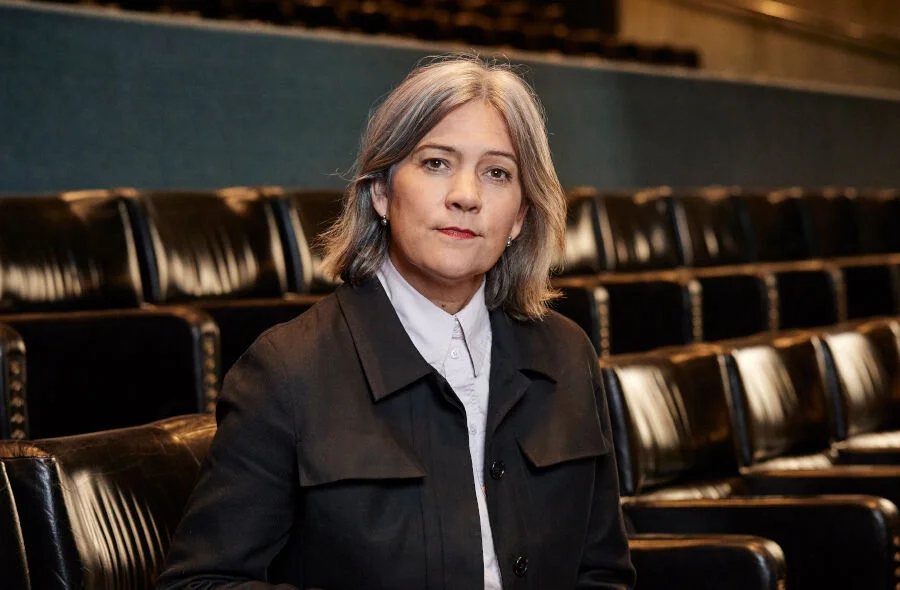
2023-05-23
“We need to get better at reaching the audience”
Program Director at SVT, Head of Film Support at the Swedish Film Institute and now CEO of Stockholm’s new regional film fund Film Stockholm. You can’t help but be impressed by Kristina Colliander’s solid career in the film and TV industry. Kristina herself says she is happiest behind the scenes – and emphasizes the collective work to succeed as an industry. We sat down to discuss audience perspectives, the future of Stockholm as a film city, and why we need to fight for creators to have the opportunity to fail and thus develop.
For those who don’t know, what is Film Stockholm?
– Film Stockholm is a brand new regional film fund with a mission to invest in productions that produce in Stockholm, to make it visible and easier for productions to shoot in Stockholm and to create conditions for talent development and skills enhancement for the industry. We work with everything from young talent and debutants to co-producing major productions.
Throughout your career you have worked in everything from production to support, what drives you to continue working in the world of film?
– I am driven by creating the conditions for important, good, fun, thought-provoking, exciting stories to reach their audience. Moving images, films and TV series have enormous power to unite people, arouse curiosity, convey knowledge, provide new perspectives and drive change in small and large ways. I love that. I also enjoy working with creative and driven people, which is what this industry is largely made up of.
What impact do you hope to make on the industry and the role of film in Stockholm?
– For myself, nothing at all, I am a “back-up person” who is confirmed in what we achieve together. A bit pretentious perhaps, but true. But together I hope we will support and develop Stockholm as a creative hub where citizens feel proud and involved.
Over the course of your career, the landscape of film and TV has changed radically. Technology is cheaper, platforms have increased dramatically and now AI is breaking new ground in film production. What are your thoughts on the future of the industry as a whole?
– The human need for stories will always exist. In the current times, there is also an increased need for belonging, for common references, and for reflection on the past as well as faith in the future. I believe that film production (in the broadest sense) will remain strong in the future, but competition for audiences will intensify. The development of technology with the enormous range on offer has meant that the audience’s demands have become and will become higher and higher.
When it comes to AI, if you’re smart, you’ll be able to use it well in production. But you have to be proactive and stay one step ahead. Globalization is also something that has increased and will increase, which means many opportunities, but it is also important to protect the local, both behind and in front of the camera. All this places higher demands on everyone in the industry. We publicly funded organizations must help to strengthen the Swedish industry’s conditions and Swedish authors’ opportunities to develop. I believe that public funding of film and TV is more important now than ever and the need will only grow in the future. Sweden has everything to gain from a strong creative industry, for its citizens and internationally.
What do you wish was talked about more in the film industry?
– The audience, the audience, the audience. Not to turn our backs on them, but because we need to be better at reaching them. Too many good productions are being made that the audience is missing out on. We need to jointly promote the importance of Swedish production, for all different kinds of people.
Then we need to protect and fight for public funding of film and TV. This is a fundamental part of continuing to develop Sweden as a creative hub at all levels, contributing to a varied and broad offering and creating a creative climate with a high ceiling. A prerequisite for creative development is that creators can occasionally make “mistakes”. Public funding can and should ensure this.
What are your tips for people who want to get into the movie business? Where to start?
– How to start depends a bit on what you want to do and where you are in life. If you’re brand new to film production, I would check the credits and think about what you’re curious about. Watch the Vocational Board’s short films about all the professions available. Then you can contact one of the regional film funds and ask how it works in your particular region.
Any new talents you think we should keep an eye on right now?
– There are so many. But I hope the industry keeps track of the more than 50 people who have participated or are participating in one of Film Stockholm’s talent programs.
What’s it like to work from Filmhuset?
– We love it. It’s bubbling. We hope it will continue to bubble and that more people will find their way here.
